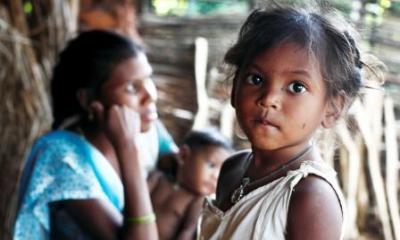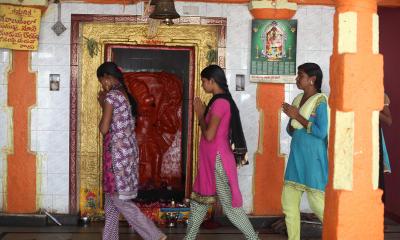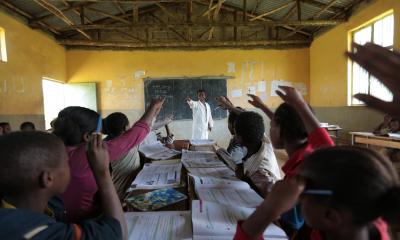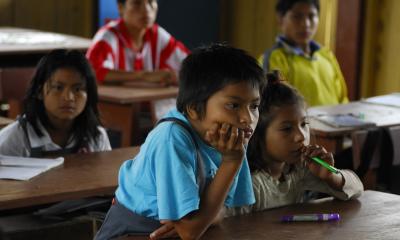
At the heart of Young Lives is a survey of the 12,000 children and their families conducted every three to four years.
The survey consists of three main elements:
- a child questionnaire
- a household questionnaire
- a community questionnaire.
The household data we gather is similar to other cross-sectional datasets (such as the World Bank’s Living Standards Measurement Study). It covers a range of topics such as household composition, livelihood and assets, household expenditure, child health and access to basic services, and education. This is supplemented with additional questions that cover caregiver perceptions, attitudes, and aspirations for their child and the family.
We also collect detailed time-use data for all family members, information about the child’s weight and height (and that of caregivers), and test the children for school outcomes (language comprehension and maths). An important part of the survey asks the children about their daily activities, their experiences and attitudes to work and school, their likes and dislikes, how they feel they are treated by other people, and their hopes and aspirations for the future.
The community questionnaire provides background information about the social, economic and environmental context of each community. It covers topics such as ethnicity, religion, economic activity and employment, infrastructure and services, political representation and community networks, crime and environmental changes.
The questionnaires are developed specifically for each survey round, to capture the changes in household circumstances and the children's lives as they grow up. In each case, a core questionnaire is produced and used across all four study countries, with specific questions and sections added by each country team to capture information of particular relevance in that country. In particular, these sections cover the reach and impact of government policy and programmes.
The household and child survey is complemented by the school survey and in-depth qualitative longitudinal research with some of the children.
Young Lives survey data and questionnaires from all four study countries are publicly archived with the UK Data Service.
Please note that Young Lives has used or adapted questions from external sources (e.g., researchers, organisations, institutions) who retain copyright over the original material and shall not be liable for any views and opinions expressed in Young Lives adaptations. To use these questions permission must be sought from the original source and not from Young Lives. Translations of these questions into Young Lives country languages were undertaken by Young Lives staff and should not be considered official translations. Any content or errors therein are solely Young Lives’ responsibility. A full reference list of these questions is coming soon.
At the heart of Young Lives is a survey of the 12,000 children and their families conducted every three to four years.
The survey consists of three main elements:
- a child questionnaire
- a household questionnaire
- a community questionnaire.
The household data we gather is similar to other cross-sectional datasets (such as the World Bank’s Living Standards Measurement Study). It covers a range of topics such as household composition, livelihood and assets, household expenditure, child health and access to basic services, and education. This is supplemented with additional questions that cover caregiver perceptions, attitudes, and aspirations for their child and the family.
We also collect detailed time-use data for all family members, information about the child’s weight and height (and that of caregivers), and test the children for school outcomes (language comprehension and maths). An important part of the survey asks the children about their daily activities, their experiences and attitudes to work and school, their likes and dislikes, how they feel they are treated by other people, and their hopes and aspirations for the future.
The community questionnaire provides background information about the social, economic and environmental context of each community. It covers topics such as ethnicity, religion, economic activity and employment, infrastructure and services, political representation and community networks, crime and environmental changes.
The questionnaires are developed specifically for each survey round, to capture the changes in household circumstances and the children's lives as they grow up. In each case, a core questionnaire is produced and used across all four study countries, with specific questions and sections added by each country team to capture information of particular relevance in that country. In particular, these sections cover the reach and impact of government policy and programmes.
The household and child survey is complemented by the school survey and in-depth qualitative longitudinal research with some of the children.
Young Lives survey data and questionnaires from all four study countries are publicly archived with the UK Data Service.
Please note that Young Lives has used or adapted questions from external sources (e.g., researchers, organisations, institutions) who retain copyright over the original material and shall not be liable for any views and opinions expressed in Young Lives adaptations. To use these questions permission must be sought from the original source and not from Young Lives. Translations of these questions into Young Lives country languages were undertaken by Young Lives staff and should not be considered official translations. Any content or errors therein are solely Young Lives’ responsibility. A full reference list of these questions is coming soon.





